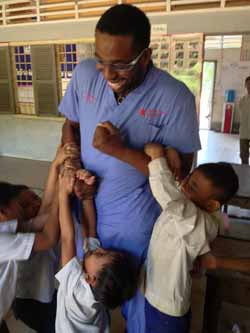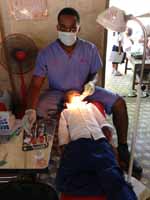Oral health students in Cambodia
Author: Fiona Halloran
Publication Date: Monday, 19 Aug 2013
Oral health students from Charles Sturt University (CSU) took a crash course in a few simple Khmer words before they began clinics for local school children in Cambodia last month.
In only the second trip of its kind, 13 final year Bachelor of Oral Health (Therapy/Hygiene) students from CSU in Wagga Wagga travelled to Cambodia for two weeks to support the work of local charity, One-2-One CAMBODIA.
One of the students - Rhema Ndukwe is now in the final months of his degree ahead of graduation from CSU in December.
He reflects on a trip described as 'life-changing':
 "Our first week in Cambodia was spent at a very underprivileged primary school on the outskirts of the capital, Phnom Penh, where we were divided into pairs to staff six temporary dental workstations setup in a classroom. None of these children had received dental care and for most it was the first time they'd come in contact with anyone outside their small community.
"Our first week in Cambodia was spent at a very underprivileged primary school on the outskirts of the capital, Phnom Penh, where we were divided into pairs to staff six temporary dental workstations setup in a classroom. None of these children had received dental care and for most it was the first time they'd come in contact with anyone outside their small community.The stations were unlike anything we are used to working in and lacked resources we take for granted in Australia such as running water, suction and at times even a dental light.
This challenge required us to learn a few key words in the local language, Khmer. Not surprisingly these included 'spit', 'open', 'open wide', 'pain' and 'swallow'.
Before we had the chance to get fully acquainted with the new language, the local children started coming into the classroom for treatment.
A lot of the treatment required by the children had progressed to a stage where extractions were the only option.
Our triage system had to be used frequently, as not every oral complication could be dealt with in the minimal time we had.
This did not come as a surprise to me, as I knew that I would have to be prepared to experience things that we would normally not see in a developed country.
I was particularly surprised by how the children were not fazed by the injections they needed as part of their oral treatments.
I think the children knew that the pain that their teeth had been causing them was soon to be relieved.
Despite the heat, and often advanced dental treatments, I could not help but notice how happy these children were when they would receive the small gifts we would present them after they received their treatment.
These moments of happiness made the day go quicker, even as we completed the treatment of 140 children or more each day.
Our breaks from work were spent at the local markets and a trip north to Siem Reap from where we visited the temples, Angkor Wat and Angkor Thom."
During the second week in Cambodia, the CSU students travelled to a second primary school on the other side of Phnom Penh for three days.
Conditions there were even more demanding than at the previous school:
 "Our workstation was a desk on which the children would lie. We stood over them to provide preventive tooth sealants on their newly erupted permanent teeth.
"Our workstation was a desk on which the children would lie. We stood over them to provide preventive tooth sealants on their newly erupted permanent teeth.Not only did it test our oral health skills but also our backs.
The remaining days were spent at a university clinic, the International Dental School in Phnom Penh, where the dental students had kindly allowed us to treat the patients normally booked for them. The dental school has facilities similar to Australian dental schools and is a testament to the dedication of the New Zealand academic who was instrumental in rebuilding the facility after it was destroyed during the Pol Pot regime of 1975. Here we had opportunities to treat adults as well as other children from local orphanages. It was interesting for us to see how most of the people came for treatment only if they had pain, and a preventative aspect of yearly visits was lacking.
As a group, we did our best to educate our patients on oral health and its importance in their overall wellbeing.
At the end of our trip, there were no regrets other than wishing the journey was a little longer.
This trip was a life changing one for me and an eye opening one.
I would strongly recommend a similar international experience to students as it is a once in a lifetime experience and very rewarding clinically and personally.
Not only did we get to experience a lot of dental needs that are extremely rare in Australia, but we also had the opportunity to experience the culture in the beautiful country of Cambodia."
Editor's Note: Read about the inaugural oral health student trip to Cambodia in 2012 on CSU News here.
The Cambodia: Oral Health and Dentistry International Experience Program was supported by CSU Global, a University initiative to encourage international study experiences. This included a Vice-Chancellor Travel Grant for students.
Media Note: The students from the School of Dentistry and Health Sciences at CSU in Wagga Wagga travelled from Sunday 22 June to Sunday 6 July 2013. Oral health student Mr Rhema Ndukwe is due to graduate from CSU in December 2013. He went to high school in Wodonga in regional Australia.
The Bachelor of Oral health (Therapy/Hygiene) is a three year program offered through the School of Dentistry and Health Sciences at CSU in Wagga Wagga.
The Bachelor of Dental Science program is a five year program offered through the School of Dentistry and Health Sciences at CSU in Orange. The first student intake is due to graduate this December 2013.
The public can make appointments at the CSU Dental and Oral Health Clinics in Albury-Wodonga, Bathurst, Dubbo, Orange and Wagga Wagga by telephoning 1300 278 642.
